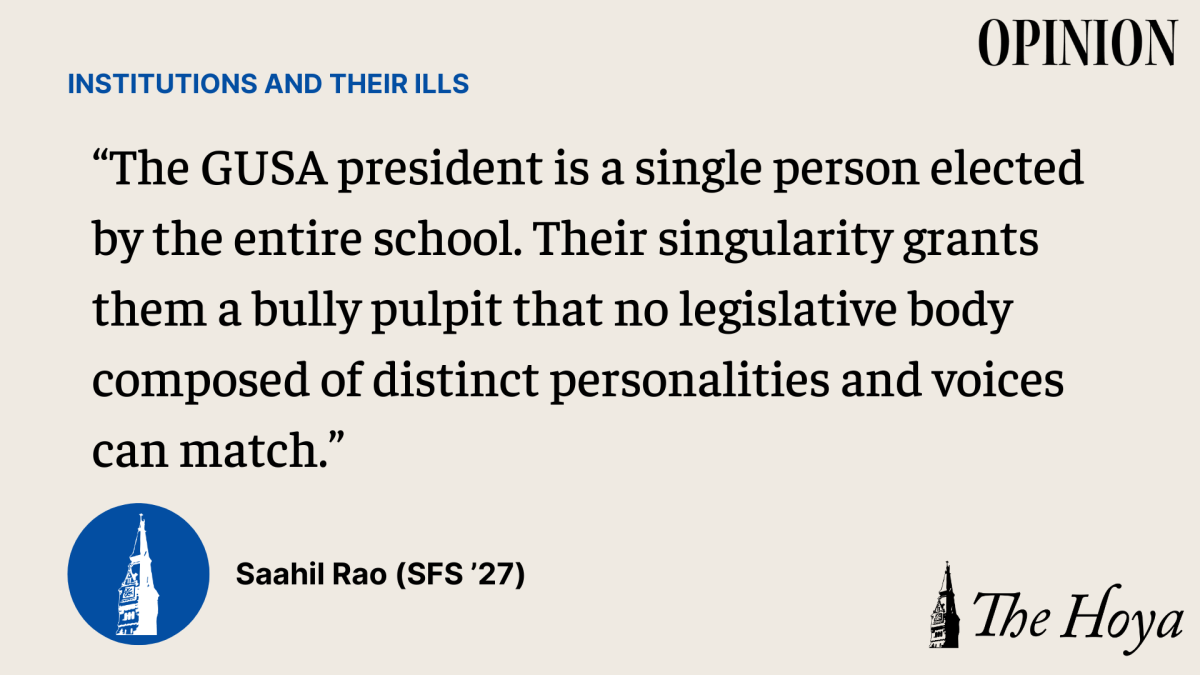
It is today, with a heavy heart, that I proclaim the death of the Georgetown University Student Association (GUSA) biweekly newsletter, which has tragically not been biweekly, or really even existent, since Jan. 26. And what a shame that is — the newsletter was a valuable resource, listing opportunities to get involved, places to leave feedback to the school and details on ongoing GUSA initiatives.
If you are a student not engaged with the GUSA on Instagram, this change might leave you confused about the status of our student government. You no longer receive emails from GUSA that you vaguely remember seeing in your inbox. You probably don’t actively seek out this type of information, so you’re likely not reading The Hoya’s weekly coverage of the body either.
You might Google GUSA, find its website and navigate to its “Policy Initiatives” section thinking you’ll finally learn more. Sadly, you’re greeted by a lonely promise that “This page will be updated as teams begin their work.”
In this scenario, a student might reasonably conclude that the GUSA executive, the body charged with enacting student-desired policy, has gone dormant. This issue has a simple fix. The Jaden Cobb (CAS ’25)-Sanaa Mehta (SFS ’25) administration must resume the most basic component of its job: sending emails. They must revive the executive’s biweekly newsletter.
To Cobb and Mehta’s credit, it is not as if the GUSA executive has not had initiatives worth writing about. Most recently, in conjunction with the GUSA Senate, our elected legislative body that passes non-binding resolutions, it worked with the university to find alternative locations for basketball courts after renovations in Yates Field House were delayed. It also successfully rallied student support for gender-inclusive housing in a Spring 2024 referendum; gender-inclusive housing is now available to the Class of 2028 through a pilot program. Their policy accomplishments have been substantive, genuinely improving the student experience.
To be fair, the administration has made more than 20 Instagram posts and held multiple town halls since taking office. Yet not every Georgetown student will receive these communications; however, everyone has a university email. What is a more foolproof way of reaching the entire student body than through the promised biweekly newsletter, to which every undergraduate student is automatically subscribed?
In not maintaining its newsletter, the Cobb-Mehta administration has failed to fulfill its promise to communicate with the student body throughout its tenure and ensure that students are aware of their proposals.
Indeed, the senate has recognized this to be a problem. The senate passed a resolution Sept. 22 proposed by Sienna Lipton (CAS ’27) recognizing that students who are not on Instagram will miss learning about GUSA policy initiatives. In the resolution, the senate resolved to “arrange a biweekly or monthly Senate newsletter,” and as they kindly put it, “inquire on the status of the Executive Department newsletter.”
This sort of initiative is laudable. However, the senate should not have to create a replacement newsletter for one that already exists. Even so, a more communicative senate cannot serve as a replacement for a strong, energetic executive. The GUSA president is a single person elected by the entire school. Their singularity grants them a bully pulpit that no legislative body composed of distinct personalities and voices can match. The executive must resume its biweekly newsletter to ensure the entire student body engages with GUSA.
The Cobb-Mehta administration has clearly had success in bringing its big ideas to fruition. Yet part of governance is also doing the small, tedious administrative things right. It has now been 35 weeks since the last GUSA biweekly newsletter was sent. There’s no reason for that number to reach 36.
Saahil Rao is a sophomore in the School of Foreign Service. This is the second installment of his column, “Institutions and their Ills.”